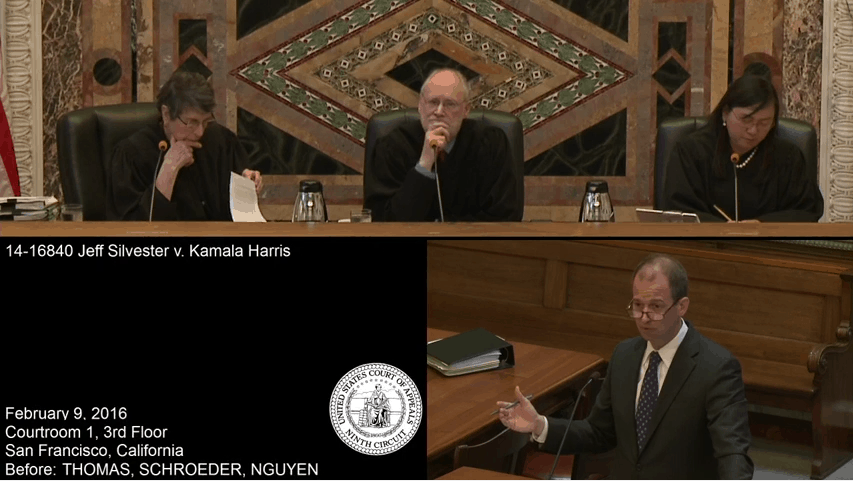
War on guns
Despite a decidedly pro-2nd Amendment trend in state legislatures across the country, California continues its war on guns without respite.
San Francisco today passed yet another law requiring people to secure firearms left in vehicles in that city that is home to not a single gun store. The law was prompted by the murder of Kate Steinle by an illegal immigrant who apparently stole the gun used to murder the young woman from a federal agent's vehicle.
To solve this problem, the law requires gun owners to secure the vehicle in a locked box inside the car or the trunk, only if it's inaccessible from the vehicle interior, unless...
The law exempts local law enforcement if they have policies of their own. The law would not apply to on–duty law enforcement from outside jurisdictions.
So, they passed a law that doesn't apply to one of the classes of citizens—law enforcement—who turn out to be the biggest problem.
9th Circuit Court of Appeals Pt. 1

Two gun rights cases were argued before the 9th Circuit Court of Appeals in San Francisco this morning. The second case was Jeff Silvester v. Kamala Harris and addressed the state's 10-day waiting period to take possession of a firearm you'd purchased.
The state appealed a ruling at the trial court level that waived the 10-day period for three specific classes of people:
- Those who already owned a gun according to the state's firearm database.
- Individuals with a valid concealed carry license.
- Those who have a state-issued Certificate of Eligibility (COE) to purchase a firearm.
Those individuals would still need to go through the background check, but could take possession of the firearm as soon as the check is finished. The state estimated that approximately 20 percent of individuals with one of the three qualifications would probably be automatically approved within an hour. The remainder would take longer, but likely less than the 10-day "cooling off" period.
The state's argument boiled down to a couple of points:
- The trial court erred in applying a "strict scrutiny" standard rather than a more lax "intermediate scrutiny" standard.
- The waiting period is such longstanding law (though the length of the waiting period has in the past been shorter and longer than the current 10 days), that it is presumptively lawful.
Based upon the rather kid gloves questioning given to the state and the insane questions posed to the gun rights attorney, I think it's safe to say that the 9th Circuit super-legislators will overturn the lower court's ruling.
Justice Jacqueline Nguyen suggested the full waiting period might be necessary because every gun purchase should be treated like a first time purchase.
Why is it unreasonable then for the state to treat all purchasers as first-time purchases given the deficiencies in the system? So, for example, the government can't tell whether your gun was lost, maybe it malfunctioned, maybe you purchased it so long ago that it's no longer in your possession. Why can't even individuals in the class be treated as if they're first time purchasers for purposes of the waiting period?
So, the argument from the bench is that California's Bureau of Firearms system and all the databases it accesses to determine if someone has a gun or it is legal to purchase a gun is such a piece of crap that we have to wait 10 days because at that point it becomes magically competent?
The attorney for the gun rights group later pointed out that a decision handed down after briefs were due (California v. Lee) where the validity of a search warrant for a convicted felon's home was upheld because California's firearm database showed he had purchased a gun in the past. The court ruled that the database record was sufficient to validate that search warrant, but now the state is arguing that its database can't be trusted when it comes to expediting 2nd Amendment rights.
9th Circuit Court of Appeals Pt. 2
The first case this morning was Tracy Rifle and Pistol LLC v. Kamala Harris and had to do with a longstanding California law that prohibits the advertising of handguns on site. Tracy Rifle and Pistol had requested a preliminary injunction against the law based upon their likelihood of successfully arguing at trial that the law is a violation of the First Amendment.
The crux of the state's argument in support of this law is that seeing a picture of a handgun will make people want to buy one immediately and then do something bad with it after they've waited 10 days.
This should be a slam dunk case—the argument that a picture of a handgun is a threat to "public safety" defies common sense. However, I have little faith that the 9th Circuit Court of Appeals is interested in upholding the First Amendment over their preferred public policy choices.
Law professor and blogger Eugene Volokh argued the case for Tracy Rifle. During his argument, he did make an amusing claim regarding why gun stores would want to advertise a handgun, rather than a more generalist "guns of all types sold here" sign. Volokh suggested the gun shop might want to advertise that they had a new model of handgun in stock for sale.
For the record, California doesn't really get new models of handguns, especially semi-automatic handguns, for sale any more.
War on guns
The war on guns in California continues apace. The year's new legislative session features a number of anti-2nd Amendment bills including ones that would ban every semi-automatic rifle with a detachable magazine in the state. Sadly, the Supreme Court of the United States is our only hope of keeping the 2nd Amendment in this liberal "paradise."
Tags




